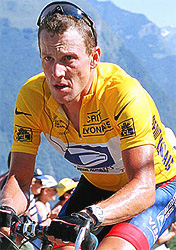July 11, 2005
Everything you ever wanted to know about sports on TV.
At The BuzzerIs the Tour de France Watchable?
Watching cycling on television is not the most exciting thing in the world, particularly in America where the sport is essentially a foreign import. But it is the very simplicity of cycling that keeps American viewers away. There are no home runs or touchdowns or three-point baskets. Nor will you find any breakaway goals or holes in one. No. The highlights here are of straightaways and turns, determination and will power. The excitement is spurred on by the commentary, thus giving cycling an air of poetry — a beauty.
| The French countryside is on display, from its vast meadows to the dangerous heights of the Pyrenees and all the cobblestone roads in between. It's a showcase of beauty set against the ultimate endurance test. |
Perhaps cycling's obscurity in America rests primarily on the fact that its SuperBowl, so to speak, takes place in France. Perhaps it is merely just the time difference. Or more likely it could be that America is already oversaturated with options for the sports fan, many of which feature larger-than-life celebrity athletes such as Tiger Woods or Shaquille O'Neal. Around the world, names such as seemingly perennial second place finisher Jan Ullrich and five time champion Miguel Indurain are lauded. Stateside, we're familiar only with Ullrich's nemesis and the shining light in sports over the past seven years: Lance Armstrong. To a much lesser extent, retired American Greg LeMonde is remembered, too, but Armstrong takes the limelight whole.
 |
As I'm writing this, I've have just watched Stage Four of the Tour. Stage Four is unique because it is a team discipline — the all-important Team Bonus Sprint, better known as the Team Time Trial. The course is a 67.5-kilometer roll between Tours and Blois. It's flat for the first 42.5 kilometers, but then it starts to get a bit bumpy, making this course a challenge. Each team, branded with corporate sponsorship (Lance rides with Team Discovery Channel — I'm not even kidding — and Germans have a very successful T-Mobile outfit), comprises nine riders, but a team must have at least five riders finish the course if they are to be awarded a time. Listening to Liggett narrate the course is an experience. The British cyclist-turned-journalist is a master of the craft and offers sharp insight into the significance of team formations, providing the viewer with an understanding as to why, for example, the rider at the head of the group will drop to the back of the line.
All the while, Liggett supposes each rider's internal thoughts while constantly updating the viewer as to what each team needs to accomplish for success. At the bottom of the screen, OLN provides a ticker showing what the leader board for the stage looks like, but since these are time trials, we never actually get a visual sense of how far ahead or behind one team are from the other. Camera coverage will cut from one team to the next and cycle through the top five or so teams. Therefore, when Liggett informs us that Swiss team Phonak is five seconds off the pace and fading or that Discovery Channel and CSC are matching each other's time pedal for pedal, the picture is cleared up considerably.
This year's fourth stage was particularly fierce. Three times, the all-time record for the stage was shattered. It was ultimately Lance Armstrong's Team Discovery Channel that captured the record time. The announcers went bonkers accordingly as Liggett put on his incredibly enthusiastic yet dignified voice on for the moment.
But what is all this "team riding?" I thought cycling was an individual sport. Well, the beauty of this stage is that that element still exists. Entering the day, American Dave Zabriskie of Team CSC wore the vaunted yellow jersey, signifier of who is the overall individual leader through all previous stages of the Tour. With a mere 1.5 kilometers to go, Zabriskie took a turn too sharp and wiped out against the railing, nearly taking out half his team with him. It's a shame, because it likely cost CSC the stage as they finished a mere 2 seconds behind Team Discovery. However, Zabriskie might be feeling ill more for the fact that his spill cost him the yellow jersey.
Even in a team event, a rider's individual time matters. In Zabriskie's case, once he became separated by the rest of his team, he began to lose time off his individual lead. Who claimed the yellow jersey as a result of Zabriskie's misfortune? Lance Armstrong. Quite the day for him, no? High drama all around with the shattering of a team trial record and the yellow jersey changing hands at the last possible moment. And all the while we got split-screen of Sheryl Crow watching the race! Like, all the time. You kidding me? Yeah, they're dating, but man, where are the other celebrity girlfriends? Still, give OLN credit. They know why people are tuning in. Might as well give them what they want.
The broadcast is flanked by on-location preview and wrap-up segments featuring American commentators Al Trautwig and Bob Roll offering their thoughts. The graphics of France and the routes from stage to stage are leaned upon heavily, but are still quite necessary in order to provide a full scope of how daunting this race is.
I want to be clear that when it comes right down to it, in spite of Stage Four's final moments, cycling is not attractive television. However, OLN is doing its best to make cycling's biggest event entertaining. The sport should thank its lucky stars that voices like Phil Liggett's can perfectly blend flair and drama into an otherwise dry and straightforward event.
Email the author.
All written content © 2005 by the authors. For more information, contact homer@smrt-tv.com
